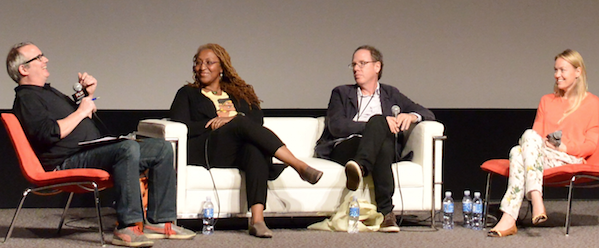What Is It That Producers Do with Directors To Make Magic?

“Any producer-director relationship is like a marriage,” said producer Lynette Howell at the Film Independent Forum last month to (Half Nelson, The Place Beyond the Pines).
Howell, along with Albert Berger (Nebraska) and Lisa Cortés (Precious, The Woodsman)—the producers behind some of the most acclaimed independent films in recent years—compared notes on how they approach the development stage. “That’s where you begin your journey as a couple, and that’s where you start to get to know who that person is,” said Howell, “and figure out what’s important to them and they get to figure out what’s important to you.” Here’s some of the wisdom they shared on using the development period to lay the groundwork for their collaborative relationship with their directors:
Think in present and future tense
Cortés likened her role to Cassandra from Greek mythology. “I’m looking ahead seeing the good things that can happen, the bad things. (Nobody believed Cassandra.) That was her curse,” she said. “As the landscape is changing dramatically, what is so important in the collaboration is developing a variety of vocabularies. One is that creative one about schedule and moving forward and the vision your director has, but it’s also vocabulary of marketing. So the first day of principle when I’m standing there, it’s not only about looking at that physical landscape that’s right in front of me but I’m looking 12 to 18 months ahead of what is my marketing going to be, what am I going to start doing in terms of social media, planting seeds in different communities to support this project.”
Focus on the story
“First and foremost, if the film is based on book, you’re trying to think of what was your impulse about this book,” explained Berger, “why did you think it would be a great film and how you are you going to get it there through the development process? To some extent, you’re thinking a little bit ahead ahead about production and what’s going to be possible and not. But really it’s about making the story work dramatically at that stage.”
Find out where your visions intersect
During development, it’s important to seek out common ground. “It’s not only what the director might have dreamed,” said Berger, “but it’s what you dreamed. You’re the person who saw it before them and you chose them for a reason. You’re trying out whether you’re seeing it the same way they are. There’s a smaller voice thinking ahead pragmatically about, ‘are we developing this in a way going to be to big for the money we’re going to get?’ you’re thinking about casting, and trying not to get too far ahead of yourself.”
Figure out what makes her tick
“For me the relationship with any director and its success comes down to finding out exactly who they are as a person and how they work what their strengths and weaknesses are so I can help enable and assist them throughout the whole process, and that starts with development,” said Howell. “Every director is different and every director is different if its their first feature or tenth feature. And I’m different with every movie that I come to based on my experience and based on what’s going on in the world and based on what’s timely, and also just based on where my taste may happen to be in that particular moment.”
Build trust
“Get to know each other when there’s time and space to breathe and not under the gun of production,” Howell advised. “By that time you really want to have established a close relationship with this person, where there’s trust and they know that you’re their ally and they can confide in you and come to you, but that when you say ‘We can’t do this and this is the reason why,’ there’s an understanding there that you’re on their side. For me it all begins in the development process.”
Pamela Miller / Website & Grants Manager